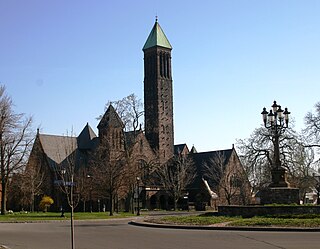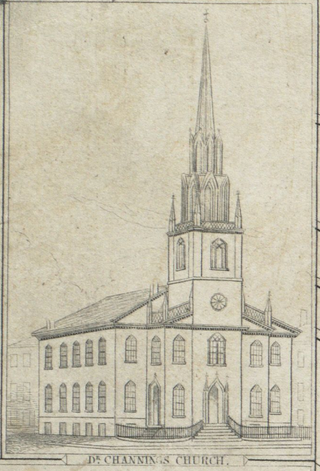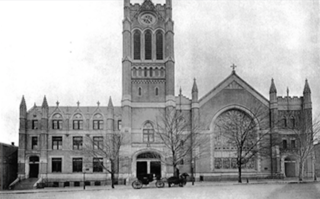Warrenton Presbyterian Church is a Presbyterian Church (USA) congregation located at 133 Watts Road near Abbeville in Abbeville County, South Carolina.

The New York Avenue Presbyterian Church is a Presbyterian Church in Washington, D.C. The church was formed in 1859–1860 but traces its roots to 1803 as the F Street Associate Reformed Presbyterian Church and another congregation founded in 1820 on its current site, the Second Presbyterian Church. It is located at the intersection of 13th Street and New York Avenue in the city's Northwest quadrant, four blocks from the White House. Due to its proximity to the White House, a number of U.S. presidents have attended services there.

The First Presbyterian Church in Chattanooga, Tennessee, located at 554 McCallie Avenue, is a historic, downtown congregation of the Presbyterian Church in America (PCA). It was the first Christian congregation founded in the city.
Warrenton Presbyterian Church is a Presbyterian congregation in Warrenton, Virginia that was organized around 1780.

The First Presbyterian Church of Hollywood is a Presbyterian Church (USA) congregation that has had a significant impact on both the Presbyterian Church and evangelical Christianity around the world.

Shadyside Presbyterian Church is a large congregation of the Presbyterian Church (U.S.A.) in an historic part of Pittsburgh, Pennsylvania, United States. Located at the corner of Amberson Avenue and Westminster Place in the Shadyside neighborhood, Shadyside Presbyterian Church was founded in 1866 as a congregation in the Presbyterian Church in the U.S.A. and has enjoyed a long history of local, national, and global recognition for its outreach and service.

The National Presbyterian Church is a Christian congregation of approximately 1,500 members of all ages from the greater metropolitan Washington, D.C. area. The mission statement of the church is "Leading People to Become Faithful Followers of Jesus Christ Together in God's World"

Fifth Avenue Presbyterian Church is a Presbyterian Church (U.S.A.) church in New York City. The church, on Fifth Avenue at 7 West 55th Street in Midtown Manhattan, has approximately 2,200 members and is one of the larger PCUSA congregations. The church, founded in 1808 as the Cedar Street Presbyterian Church, has been at this site since 1875.

Baillieston St Andrew's Church is a congregation of the Church of Scotland, a member of the Presbyterian Church. The church building is located on the corner of Bredisholm Road and Muirhead Road, Baillieston, Glasgow, Scotland. The church today serves the town of Baillieston.

The First Presbyterian Church in Buffalo, New York was the first organized religious body formed in what was then the western frontier of New York State. The town of Buffalo was sparsely populated when the church was organized on February 2, 1812. However, having survived the War of 1812, the town of Buffalo was rebuilt and rapidly grew with the completion of the Erie Canal in 1825. The first two buildings were located on the same downtown lot. However, the congregation relocated between 1889 and 1891 to its present location approximately one and-a-half miles to the north in a more residential area.

Historic First Bryan Baptist Church is an African-American church that was organized in Savannah, Georgia, by Andrew Bryan in 1788. Considered to be the Mother Church of Black Baptists, the site was purchased in 1793 by Bryan, a former slave who had also purchased his freedom. The first structure was erected there in 1794. By 1800 the congregation was large enough to split: those at Bryan Street took the name of First African Baptist Church, and Second and Third African Baptist churches were also established. The current sanctuary of First Bryan Baptist Church was constructed in 1873.

The Federal Street Church was a congregational Unitarian church in Boston, Massachusetts. Organized in 1727, the originally Presbyterian congregation changed in 1786 to "Congregationalism", then adopted the liberal theology of its fifth Senior Minister, William Ellery Channing, (1780–1842). For most of the 18th century the church was known as the Long Lane Meeting-House. In 1788, state leaders met in the relatively spacious building to determine Massachusetts' ratification of the United States Constitution. Thereafter the church renamed itself the Federal Street Church in honor of the event. In 1803, it called William Ellery Channing, (1780–1842), as its minister who defined "Unitarian Christianity" and launched the Unitarian movement, making the Federal Street Church one of the first to define itself as Unitarian.

The congregation of North Presbyterian Church, at 525 West 155th Street in Manhattan, New York City, is a combination of three former congregations: North Presbyterian Church, Washington Heights Presbyterian Church, and St. Nicholas Avenue Presbyterian Church.

First Presbyterian Church is a historic church at 213 Main Street in Clarksville, Tennessee. The congregation is currently affiliated with the Presbyterian Church (USA).

Old Kingsport Presbyterian Church is an historic church located in Kingsport, Tennessee. The church was organized May 20, 1820 as the Boatyard Congregation. It is the oldest one of any denomination in the city of Kingsport. It is a member of the Presbyterian Church (U.S.A.).

Bay Ridge United Church (BRUC) was located on Bay Ridge Parkway (636) in the Bay Ridge Section of Brooklyn, New York. The congregation was a blend of two churches from two similar but different denominations and was a member of both the Reformed Church in America and the Presbyterian Church (U.S.A.).

First Presbyterian Church of New Orleans is the oldest Presbyterian congregation in Louisiana (1818) and the second oldest Protestant congregation in the entire Mississippi Basin after Christ Church of New Orleans (1816). First Presbyterian Church of New Orleans (FPCNO) has played a pivotal role in the history of the Protestant church in the South as well as the history of New Orleans in the late 19th century, especially under the political and religious leadership of Rev. Dr. Benjamin Morgan Palmer who encouraged the Southern Presbyterian Church to secede at the beginning of the American Civil War, an action which was quickly imitated by most of the other Protestant denominations in the Confederate States of America. However, in the 21st century, FPCNO is now more widely known for its progressive stands on race, social justice and gender issues.
The Greater Hood Memorial AME Zion Church was the first black church in Harlem, New York. It now receives notoriety as the "Oldest Continuing" church in Harlem. The church’s first house of worship was erected on East 117th Street, between 2nd and 3rd Avenues in 1843.

The Highland Church was a Gaelic-speaking congregation of the Church of Scotland, based in Tollcross, Edinburgh. Formed by the union of St Oran's Church and St Columba's Gaelic Church in 1948, the congregation continued united with Tolbooth St John's in 1956.

Meade Memorial Episcopal Church is a predominantly Black Episcopal Church in Old Town Alexandria, Virginia. Founded in 1870, the church today is supported by a congregation that includes descendants of the original founders of this parish. Meade Memorial belongs to the Episcopal Diocese of Virginia, whose members continue to serve the community and the Episcopal Church by participating in regional and Diocesan activities.

















